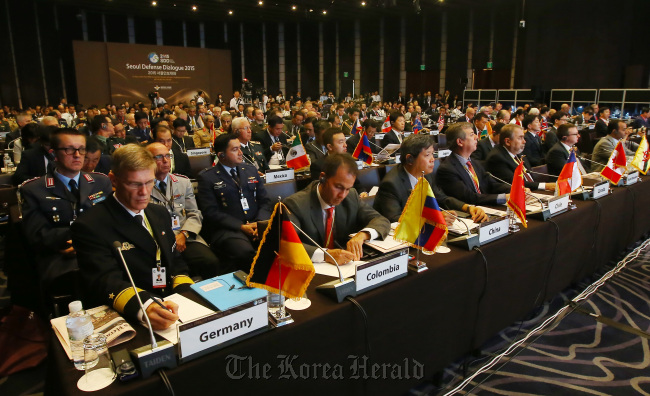Some 250 top defense policymakers, military executives and academics from more than 30 countries on Thursday stressed the significance of concerted efforts of neighbors in achieving a peaceful integration of the Koreas, saying their division remains a regional threat.
As the Seoul Defense Dialogue kicked off, the participants explored possible scenarios of the unification, from a “soft landing” based on a mutual consent, to a “hard landing” involving an abrupt fall of the Kim Jong-un regime or possibly another armed conflict. They also discussed the role of the U.S., China and other key players in establishing durable peace, and potential shifts in the regional security architecture that will follow the unification.
“The unification process may be coming up suddenly, without any notification and expectation,” said former Japanese Defense Minister Satoshi Morimoto who now teaches at Takushoku University in Tokyo.
“But whatever the scenario will be coming up, we have to respect and put priority on (the idea) that the future prospect and picture of a new unified Korea should be made by decision by both Korean people exclusively. We should not interfere, cannot do so.”
As the Seoul Defense Dialogue kicked off, the participants explored possible scenarios of the unification, from a “soft landing” based on a mutual consent, to a “hard landing” involving an abrupt fall of the Kim Jong-un regime or possibly another armed conflict. They also discussed the role of the U.S., China and other key players in establishing durable peace, and potential shifts in the regional security architecture that will follow the unification.
“The unification process may be coming up suddenly, without any notification and expectation,” said former Japanese Defense Minister Satoshi Morimoto who now teaches at Takushoku University in Tokyo.
“But whatever the scenario will be coming up, we have to respect and put priority on (the idea) that the future prospect and picture of a new unified Korea should be made by decision by both Korean people exclusively. We should not interfere, cannot do so.”

Under the theme, “70 years of the Post-WWII Era and the Division of Korea,” the vice-ministerial conference is also scheduled to examine pressing security challenges, such as cybersecurity, maritime conflicts, health, terrorism and nuclear proliferation.
Hosted by Seoul’s Defense Ministry, the annual event is its fourth edition and ends Friday.
Other attendees include Vice Defense Minister Baek Seung-joo, Vice Foreign Minister Cho Tae-yong, Martin Libicki, a professor at the RAND Graduate School in the U.S., and Robert Pape, a security and terrorism expert at the University of Chicago.
David Helvey, a former U.S. deputy assistant secretary of defense for East Asia and visiting scholar at the National Defense University’s Institute for National Strategic Studies in Washington, said last week’s spike in cross-border tension, including an exchange of fire, again underscored the deep-rooted source of instability spanning 70 years of division.
While any unification process has to be built on the wishes and consent of the two Koreas, the U.S., as a “good friend and ally” of the South, will need to work on reshaping external security conditions following their merger, in line with perceived shifts in the balance of the power, he noted.
“(Efforts) to have an inclusive multilateral security architecture has been limited in Northeast Asia,” Helvey said. “It requires the willingness of all parties to make a binding commitment on hard security issues, not just to deal with the soft stuff. In the absence of such commitments, this type of structures cannot effectively serve the constraints on major powers.”
Edmond Mulet, assistant secretary-general for peacekeeping operations at the U.N., called for greater regional dialogue and collaboration to better tackle security challenges, whether conventional and emerging, including the North Korean nuclear issue.
“The division of the Korean Peninsula is a cause for contemplation of the enduring challenges to peace and security. Today, this division continues to cause concern and uncertainty for international peace and security and for a region ― East Asia ― which has been in the past decades economically most vibrant,” he said in his keynote speech.
“It is my conviction that regional integration is one of the most effective ways to respond to current peace and security challenges. I am convinced that this is one of the avenues to explore for East Asia.”
By Shin Hyon-hee (heeshin@heraldcorp.com)


![[Exclusive] Korean military set to ban iPhones over 'security' concerns](http://res.heraldm.com/phpwas/restmb_idxmake.php?idx=644&simg=/content/image/2024/04/23/20240423050599_0.jpg&u=20240423183955)

![[Graphic News] 77% of young Koreans still financially dependent](http://res.heraldm.com/phpwas/restmb_idxmake.php?idx=644&simg=/content/image/2024/04/22/20240422050762_0.gif&u=)



![[Pressure points] Leggings in public: Fashion statement or social faux pas?](http://res.heraldm.com/phpwas/restmb_idxmake.php?idx=644&simg=/content/image/2024/04/23/20240423050669_0.jpg&u=)









